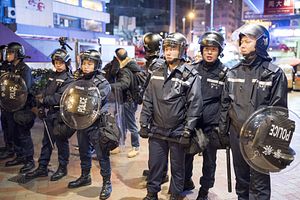HONG KONG – One of China’s top bureaucrats, Zhang Dejiang, 69, will arrive in Hong Kong on May 17, 2016 on a three-day visit. Officially, he is here to focus on the city’s economic development and to deliver a keynote speech at a forum on China’s “One Belt, One Road” trade initiative. This will be followed by a ceremonial banquet at the Hong Kong Convention and Exhibition Center attended by prominent businessmen, community leaders, and lawmakers, as well as local delegates to the National People’s Congress and the Chinese People’s Political Consultative Conference.
Zhang’s visit has prompted one of the largest police taskforce initiatives since the 2014 universal suffrage protests in the city. Some 18,000 police days (3,000 police working in 12-hour shifts over three days) will be mobilized to protect him during his visit. The risk level has been designated as “very high” for this visit. To give that some context, Zhang’s visit has prompted the deployment of a police force three times that of the last visit by a sitting premier and president, when the risk level was only designated as “high.” Major roads and arteries will be temporarily shut down whenever he is approaching, and security cordons have been set wider than usual so that protesters and journalists are kept away from him.
This is an important visit in many respects. Zhang will be the first Chinese state leader to visit Hong Kong since 2012, when President Hu Jintao came to Hong Kong to officiate the inauguration of the now embattled Chief Executive Leung Chun-ying. But this only scratches the surface.
Zhang, who ranks third behind President Xi Jinping and Premier Li Keqiang on the Politburo Standing Committee, has an illustrious history as a politician, known to have moved up the ranks on the back of connections and allegiances. He is known and relied upon as a ruthless enforcer. Zhang is the only person to have held the title of Party Secretary in four different provinces, Jilin, Zhejiang, Guangdong and most recently, as replacement for Bo Xilai in Chongqing. It was during his time in Guangdong that he built a fundamental understanding of the Pearl River Delta region and Hong Kong.
In 2013, he was appointed chairman of the National People’s Congress (NPC), equivalent to speaker of the house. In that same year, he was appointed to head the Communist Party’s Central Coordination Group for Hong Kong and Macau affairs which comprise heads of 18 ministries and departments, and is considered to be China’s de facto policy body for Hong Kong and Macau.
It was during his tenure in August 2014 that the NPC released a white paper that proposed a voting system where Hong Kong citizens were to adopt universal suffrage in 2017. However, according to the NPC proposal, there could only be two or three candidates, and all were to be vetted and approved by half of a 1,200-member committee, itself likely approved by Beijing. The whitepaper triggered a 79-day occupy protest, shutting down roadways in Hong Kong’s Central Business District and garnering international attention. The protest, now commonly known as the Umbrella Movement, was widely compared to the Arab Spring. Despite the protest, the Hong Kong government adopted the white paper wholesale and presented it as an electoral reform package. It was rejected by the Legislative Council in June 2015.
This is also a timely visit as Hong Kong is only four months away from the next Legislative Council elections in September, and less than a year from the chief executive election in March 2017. The chief executive election which will determine the leader of Hong Kong for the next five years. Though Zhang is not expected to make explicit comments on who Beijing wants in the top job in Hong Kong, there is no doubt that part of his duties will be to do some reconnaissance work ahead of Xi Jinping’s expected visit next year, for the 20th anniversary of the handover of Hong Kong. All eyes will be on Zhang.

































